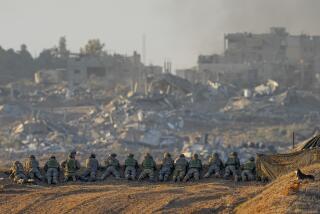War Unites Doves and Hawks
- Share via
The beginning of the Persian Gulf War has had a dramatic impact on the doves in American unions, those who have furiously opposed U.S. military moves abroad since World War II.
Before the United States and its allies moved on Iraq on Jan. 16, these union leaders pleaded with President Bush that the best way to get Saddam Hussein out of Kuwait was to prolong the United Nations’ economic sanctions.
After the allied air force action began, labor’s doves decided that it was useless to continue their failed “let-the-sanctions-work” campaign and began saying, though somewhat reluctantly, that they support the war against Iraq.
The apparent lack of a viable alternative is finally bringing labor’s hawks and doves together, at least on the war in the Middle East.
Although the traditional anti-war unionists are lukewarm in their support for the war, they refuse to join those demanding that the United States just stop fighting and withdraw from the Middle East.
Although many of the former labor doves changed their position with great reluctance, others are now vigorously behind the effort to oust Hussein.
Particularly vigorous support for the war against Hussein is coming from two now-retired but still influential labor leaders who have long been among the most vocal anti-war activists and who have strongly opposed increases in military spending, even though large numbers of their own union members work for military contractors.
“Look, I’ve always been proud to be called a peacenik by those damned Cold War warriors in the labor movement, but, my God, we’ve got to stop this madman (Hussein), and all unions must fully back the war against him,” says William Winpisinger, recently retired president of the International Assn. of Machinists.
Although nearly a third of the machinists union’s 560,000 members work in the defense industry, Winpisinger and his successor, George Kourpias, fought against increased military expenditures, arguing persuasively that far more jobs are created when federal money is put into non-military programs.
Douglas Fraser, ex-president of the United Auto Workers and also usually an anti-war activist, now says, “Hussein is a real danger and if he isn’t stopped now, we will pay a hell of a price in the next few years because he would certainly move to try and take over more of the Middle East and be even more dangerous than he is now.”
Like other labor doves, Fraser says sanctions can now become devastatingly effective because they are augmented by powerful air strikes against Iraq. Therefore, he adds, the United States and its allies should not initiate a potentially bloody, costly ground war.
Those struggling to build opposition to the war in Iraq say they’re deeply disappointed that the strong support they received initially from American unions has halted.
Since World War II, union leaders have been sharply divided between hawks and doves, between those who supported military spending increases and those demanding massive military cutbacks, between those backing the United States in wars such as the one in Vietnam and those who opposed such conflicts.
Labor’s military hawks have traditionally been strong in the so-called hard-hat unions, and before the Iraq war began, presidents of 15 national construction unions pledged their unqualified support for Operation Desert Shield. That support is continuing.
Doves in the labor movement were equally adamant on the other side. Their strong opposition to quick military action raised hopes among those organizing anti-war demonstrations around the country that there would be an impressive array of powerful unions joining the outcry against war, just as there was against the Vietnam War.
Presidents of 11 of the largest unions in the country pleaded publicly and privately with President Bush to wait before moving against Iraq, saying in a joint statement: “We emphatically oppose the initiation of offensive military action by the United States at this time.” They demanded that Bush give more time to let sanctions work.
Organizers of campaigns against the war had hoped that tens of thousands of unionists would swell crowds at demonstrations and give new momentum to the anti-war effort.
That hope has evaporated at the national level, although there are still calls from some local-level unions for the United States to remove its troops now.
William Henning, head of a large New York local of the Communications Workers of America and a leader in a group called New York City Labor for Peace, voiced his disappointment with the reaction of the national labor leaders.
He predicts, though, that as the war continues, more local unions and their members will join in opposition to it because “more killing isn’t the way toward peace. Sooner or later, we will have to agree on terms to end the war, and since we (the United States) started it, it is up to us to stop it.”
Before the war began, arguments on both sides in the debate among the union leaders were similar to those heard in Congress.
No leader supported Saddam Hussein’s invasion of Kuwait, but they differed on how to get Iraq to withdraw.
Although the AFL-CIO itself has taken no official stand--that will come at its executive council meeting next month--federation President Lane Kirkland says that “whatever the differences over the best way to end Iraq’s brutal occupation of Kuwait, the differences must now be set aside.
“The American labor movement stands in full support of our country . . . to bring this conflict to an early and decisive conclusion.”
Kirkland apparently expresses the consensus of the leaders of the 14-million-member labor federation, which means that for the first time in 46 years, unions generally are united behind a war involving the United States.
More to Read
Get the L.A. Times Politics newsletter
Deeply reported insights into legislation, politics and policy from Sacramento, Washington and beyond. In your inbox twice per week.
You may occasionally receive promotional content from the Los Angeles Times.










